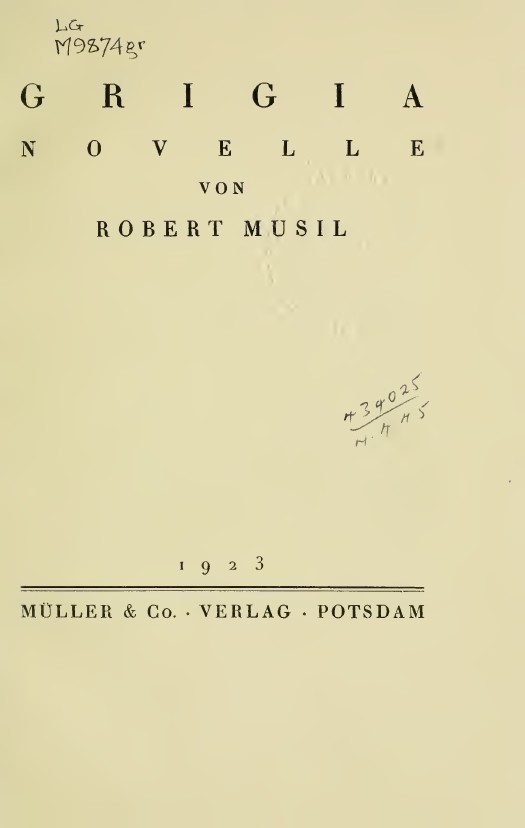I visited Lübeck in July 2015, a few months after Günter Grass had passed away. I was there to visit Thomas Mann’s museum as part of a trip that also took me to Husum, Theodor Storm’s hometown, but since Grass had his own museum and I had time, I decided to drop in. Walking around inside, unable to understand the German on the walls, I did at least manage to enjoy Grass’s drawings and countless photos of undersea wreckage. I gathered that this was something to do with his 2002 novel, Crabwalk, and bought a copy of it as a trophy and memento. Unlike my unread copy of The Tin Drum, I’ve actually dragged myself through Im Krebsgang twice, and will probably read it a third time. I didn’t particularly enjoy it, but it’s easier to write on what you know, and I’ve exams to prepare for.
I cheated with Cat and Mouse because I read it in translation. However, I now think this was a good decision. I was able, for the first time, to meet Grass without my faulty German acting as an untrustworthy intermediary. Grass is often considered the most important German-language writer since the Second World War, and I wanted to see what the fuss was about. Cat and Mouse is a short novel about the past, about Germany’s horrific past, and individual lives within it. It takes us into wartime Danzig and follows a single figure, Joachim Mahlke, through the eyes of a friend. From the warplanes above on the first page the atmosphere is ominous. All the more so because for most of the book we don’t know why we need to hear this story. But as readers, we suspect the narrator has something bothering him, something only half-acknowledged.

Childhood in a Time of War
Cat and Mouse begins in Danzig a short while into the Second World War – the novel is technically second in a loosely connected trilogy of works by Grass, after The Tin Drum and before Dog Years, but it can certainly be read separately from them. Our main characters are schoolchildren, rather than adults, which gives us a different perspective on the War from what’s typical. Yes, there are planes overhead, but the War’s impact on the children is indirect at best, at least at first. The children compare notes on various warships from rival powers, and they dive in a sunken Polish minesweeper to dig up trinkets.
Real violence seems far away. The opening scene describes a successful attempt by the narrator, who is suffering from toothache, to get a cat to pounce on Mahlke’s oversized Adam’s Apple, which the narrator calls Mahlke’s “mouse”. Beneath the planes, toothache and pranks are the order of the day. The principal of their school is “high party official”, but for the kids he is first and foremost a principal. The magic of childhood is not destroyed by the War so much as slightly distorted. Words like “up to” when describing time hint at later difficulties, while the knowledge of warfare is perhaps disturbing, but at least early on in Cat and Mouse we are given the impression that all is well in their world.
Two Worlds
But there are two worlds at play here, not one. Cat and Mouse as a title reflects a division between two antagonistic beings, one stronger than the other. In practice, this refers to German society at the time, and Mahlke himself. Mahlke is an oddball. He is a Catholic, like the narrator, but his Catholicism is distorted by a strange worship of the Virgin Mary beyond what is acceptable. He doesn’t fit in with his peers either. When the boys go out to the minesweeper, most of them sit on the deck and sunbathe, while Mahlke usually exception dives down alone in search of treasure.
This underwater world is Mahlke’s world. His “light-blue eyes… filled with curiosity only under water”, and Mahlke builds himself a base in part of the boat where water has not reached. Nobody else has ever reached his hideout, which requires lung capacity beyond their own. Like Mahlke’s mind – Cat and Mouse has very little direct or reported speech – the hideout remains hidden from us. In it he stores the trinkets he finds, such as a small Polish virgin and a gramophone. It is a strange hobby, Mahlke’s “fanaticism” for diving, but it provides him with “a goal in life” completely disconnected from matters above water, from the War. For even Mahlke’s perception of the world is strange – we learn that “Great events were shaking the world just then, but Mahlke’s time reckoning was Before learning to swim and After learning to swim”.
War and the classroom
War does eventually break into the classroom, but slowly. A teacher is arrested and students are questioned. Then there is a lieutenant who returns and gives a talk, describing his experience in the air force cheerily as “some merry-go-round” and “pretty much the same as in the old days when we played handball in our good old recreation yard”. But of course, such a speech has been doctored for the schoolchildren, and only briefly do other emotions and darker thoughts break through the humour and lightness, such as when the speaker mentions “some that couldn’t take it”. And when the speech is finished, the narrator informs us casually that “he had graduated from our school in ’33 and was shot down over the Ruhr in ‘43”. The children do not notice what we, who are older and wiser, know to look out for.
Mahkle’s Other Goal
Another time a lieutenant commander comes and Mahlke, for reasons unknown, steals his medal and stows it away in his hideout while the man is supervising their gym class. Guilt then gets the better of him and he confesses the theft to the principal. He is then summarily expelled and sent to a different school. There, Mahlke develops a plan to recover his honour – he plans to come back to his initial school to give a speech, and the only way to do that is through fighting. He joins the army and disappears. The narrator is a little way behind, picking up scraps of information about his friend but little concrete information.
When they meet again, Mahlke is already a hero, but the two of them are unable to connect. Their language fails them. The narrator keeps repeating himself. And Mahlke isn’t given permission to speak at the school either – rules are rules, the principal reminds him. Mahlke, who was no patriot, learns that it was all for nothing.
Form and Structure
Cat and Mouse is interesting at least as much because of its form and structure as because of its story. From the very first words, “…and one day”, we are thrust in media res into the story, and this leaves us with more questions than answers. We do not learn, at least at first, why the narrator is writing, except obliquely, when he says he “ha[s] to write.” And he is speaking just as much as he is writing. Cat and Mouse is an oral story, which raises questions, later answered, about who is listening. When we write, we can be writing for ourselves, but when we speak, we demand something more – judgement, or perhaps support.
Cat and Mouse follows Mahlke and not the narrator. All the same, the narrator, who consciously hides himself, is just as much of an enigma as his quarry. Each chapter seems like a fragment of some longer dialogue, wrenched out of thin air, and many begin with questions, or ellipses to indicate this fragmentation. There are also, occasionally, moments where the long paragraphs split up into short, single-sentence paragraphs, such as:
“What’s the matter with him?” / “I say he’s got a tic.” / “Maybe it’s got something to do with his father’s death”.
These moments, where other characters seem to speak together, remind me of a Greek chorus. Everyone is trying to understand Mahlke, but nobody can. Cat and Mouse’s fragmentary search through the past is partially a quest to reconstruct him from the boy whose legend as “The Great Mahlke”, the amazing diver, has displaced the underlying reality. But there’s much more going on here than that.

Literature after Auschwitz – Cat and Mouse and Memory
Cat and Mouse is, like Ian McEwan’s Atonement, an attempt to reformulate and re-evaluate the past so as to come to terms with it. The narrator is cagey because he feels he has a hand in Mahlke’s ultimate fate, a hand he’s unwilling to acknowledge. The odd comment, like when he says “I alone could be termed his friend”, speaks to a kind of guilt. As the novel progresses, the narrator becomes ever so slightly more open, describing “this gloomy conscience of mine” and mentioning his conversations are with a “Franciscan Father Alban” without getting to the point of ever saying what exactly hangs over him until the very end.
In truth, the narrator is obsessed by Mahlke, because he is unable to escape his guilt – but nor can he face it directly. At the very end of the novel, in the climax scene, Cat and Mouse briefly shifts into the third person – “Pilenz shouted: “Come up!””. The narrator – whose name is Pilenz – is even ready to use linguistic trickery to distance himself from his actions.
Theodor Adorno, one of the major German critical theorists of the 20th century, wrote that to write poetry after Auschwitz is “barbaric”. Paul Celan, a German-language poet, revised that by suggesting that poetry written after Auschwitz can only be worthwhile if it is about Auschwitz, directly or indirectly. Both of these thoughts reflect a central preoccupation in German-language literature after 1945 – that of guilt, and how to deal with it in writing. Günter Grass, in his autobiographies, confessed to being an enthusiastic member of the SS, but we shouldn’t let that get in the way of thinking about Cat and Mouse. Rather we should read Cat and Mouse in light of Celan’s comment. It is a book that is deliberately reflective, looking back into the past from an unspecified point in the future, and not trying to find answers so much as to atone.
It is not an easy process. The fragmentary nature of the book, as I suggested above, makes it feel like it is compiled from a much greater source. And while on a literal level, this source is the narrator’s chats with the priest, on another level Cat and Mouse records just an individual instance of a general project, that of the German people’s coming to terms with their complicity in violence and horror during the Second World War and Nazi Era more broadly. Cat and Mouse is a book of obfuscations, feints and trickery, but this is not because of the narrator’s bad conscience so much as the challenge of actually truly coming to admit responsibility when every part of you begs you to go on hiding from it.
Pilenz, the Narrator of Cat and Mouse
But questions remain, and Pilenz, the narrator of Cat and Mouse, is at their centre. I’ve avoided using his name just as he avoids it. He only tells us it halfway through the novel. Just as he consciously hides his guilt so too does he consciously hide himself: “I’m not going to speak of myself, my story is about Mahlke”. But sentences like this only further draw our attention to him.
I don’t feel I have all the answers here, or at least an interpretation I can give to what I’ve read that makes sense, but I’ll do my best. Here are the basic facts: Pilenz lives with his mother. His father is away fighting, and an older brother too. The brother, who was the favourite child, dies, and at home he daily bears witness to his mother’s infidelity. It is not a happy life. Other examples, such as a sexually abusive priest from his youth, come up in passing.
I think Pilenz is consumed by guilt, both for his responsibility in Mahlke’s fate, and for his own life’s course. He mentions travelling to Nazareth and Ukraine in search of a way to live. “I should be able to believe, to believe something, no matter what, perhaps even to believe in the resurrection of the flesh” – these are his hopes, but not the reality. After the War, after the destruction, Pilenz has no spiritual centre. He is lost and cannot find himself. In telling Mahlke’s story he is not trying to tell his own so much as save it, to give himself a chance to find the meaning he longs for. We can only guess as to whether he succeeds.
Conclusion
“Who will supply me with a good ending?” Pilenz asks in the final chapter. Reading Cat and Mouse it is obvious that there cannot be a happy ending here. The very absence of a happy ending is the motor that keeps Pilenz talking and us reading. We want to understand what ending we will get, and what Pilenz’s role in it is.

I think I probably liked Cat and Mouse. It is short and focused, and I found its structure interesting and ideas worth thinking about. I enjoyed the connection between diving into the underwater world of Mahlke’s minesweeper and the Pilenz’s “diving” into the past to try to reconstruct their friendship. Overall, I can readily recommend the book to people who think it all sounds interesting. But I can’t say I enjoyed it on a human level. The characters weren’t endearing, and the message of guilt and atonement felt rather too closely bound with its era to be engaging on a personal, rather than intellectual level. But that’s just me.






